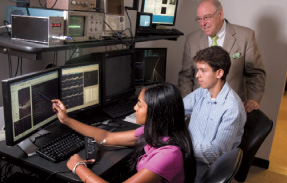Making movies for monkeys
 High school interns watch TV monitors (with Yerkes director Stuart Zola) to observe and record primates’ reactions to the short movies they made during an educational summer program fueled by economic stimulus funds. |
The plot: someone assembles a hat, adding stickers and other doodads, one at a time, and then dons the finished product.
The audience: four rhesus monkeys at the Yerkes National Primate Research Center are quite intrigued, especially when a bit of the action changes. After viewing the movie only once or twice, the monkeys’ eyes move to anticipate the next source of action, indicating that they remember the sequence in the movie, which was written, filmed, and produced by 10th-graders at the Gwinnett School of Mathematics, Science, and Technology who interned at Yerkes this summer. The production value: For Yerkes cognitive neuroscientist Elizabeth Buffalo, the ongoing eye movement studies suggest a possible way to diagnose mild cognitive impairment, a frequent precursor of Alzheimer’s in humans. For the students, watching the rhesus monkeys respond to changes in their movies is proof positive that science can be fun, maybe even worth a lifelong career.
That means the eight-week Yerkes summer research and learning program was successful. Attracting students from all demographic groups to health-related sciences is both a national priority and the reason the NIH offered economic stimulus funds to selected NIH-designated primate research centers with experience in sharing the excitement of science with young students. Under a grant headed by Buffalo, the six students hired as interns spent two weeks learning the basic concepts of neuroscience. They then divided up to work under the tutelage of Yerkes neuroscientists studying topics such as cognition and memory, emotional processing, the role of the basal ganglia in Parkinson’s, and how brain volume changes with age. Three high school teachers—including one from the Gwinnett school, where Yerkes director Stuart Zola serves on the board—also participated in the program, assisting in the labs and preparing lesson plans on what students learned to enrich the program at their own schools and those of other science educators in a state network. —Sylvia Wrobel


